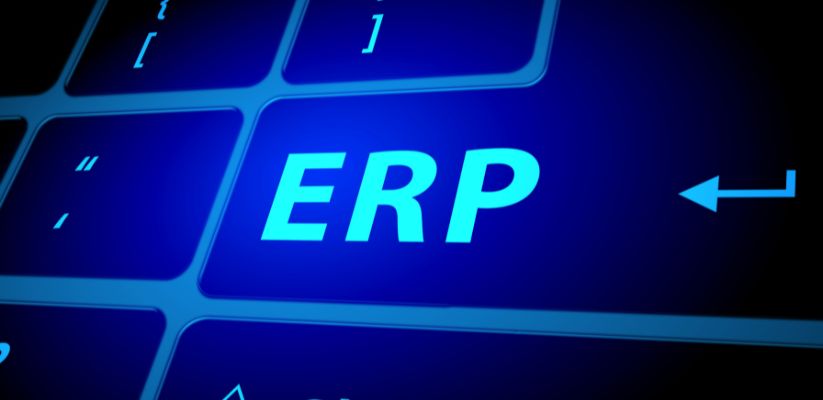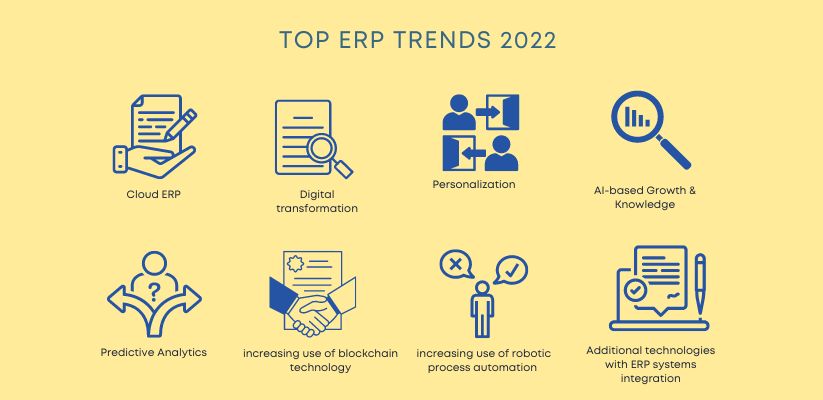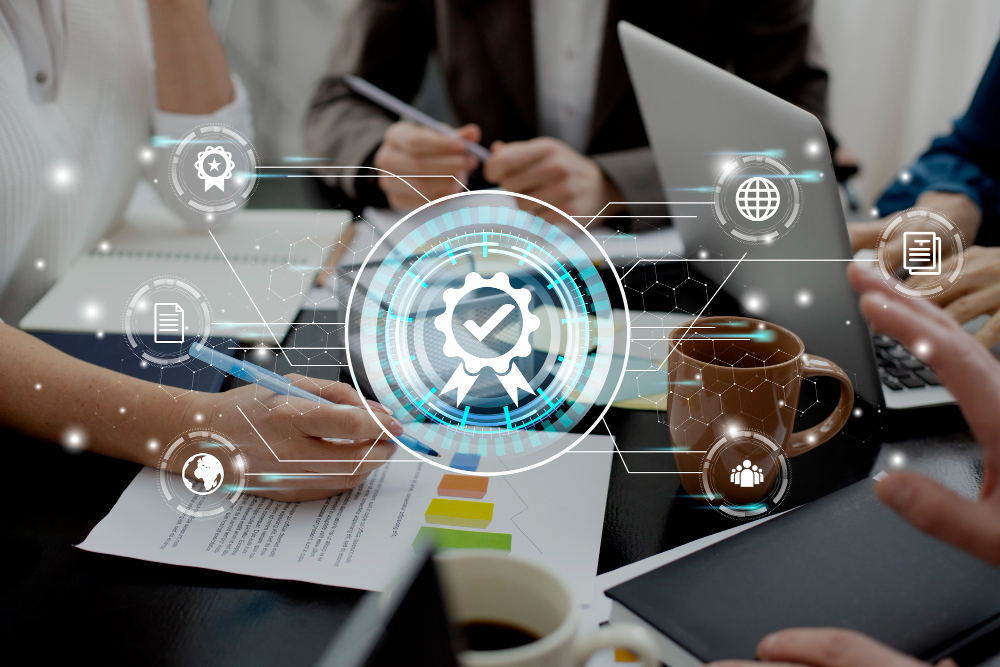SUMMARY– ERP solutions have been advancing for a long. These solutions have expanded vastly to support crucial business operations like HR, Procurement, Accounting, Manufacturing, Sales Force Automation, E-commerce, and much more.
” ERP is commonly misperceived as a computer system. Not so. It’s a people system made possible by the computer software and hardware.”
– Thomas Wallace
Companies have been relying on ERP to cut costs by removing recurrent processes, automating price-significant tasks, and offering employees simple access to essential data while making rapid decisions.
Since businesses consistently depend on ERP to run, these systems are predicted to continue to deploy the latest technologies while supporting a broad range of functions.
Top ERP Trends
This post will show the top ERP trends and beyond.
-
Cloud ERP
In the past, a lot of organizations deployed on-premises ERP applications. These organizations were quite unwilling to trust the principal business applications to the cloud. But today, the scenario is changing fastly. Companies have adopted cloud ERP to leverage low costs, simple deployment, new functionality, reduced need for IT resources, and the functions to embrace business success.
The Covid-19 pandemic has enlightened the cloud ERP value and partially geared the focus from on-premises ERP software. These cloud ERP applications help employees complete their work from any location with the essential requirement of having an internet connection.
However, some management heads of the offices are looking for less expensive systems owing to the economic crisis and are increasing their investment in cloud ERP for advanced support to their remote workers.
-
Digital transformation
This refers to integrating digital technology in all business operations to enhance daily business operations. It can also help boost revenue and the competitive edge while enhancing employee productivity and customer communication and service.
ERP software usually considers most aspects of an organization, so it is one logical place to ensure the transformation. A recent survey showed that companies have been deploying cloud ERP as a way to advance. The trends, including AI adoption, ERP integration with the internet of things IoT devices, and advanced analytics, are also a part of digital transformation.
Also Read: Which Business Industry needs ERP Software the most?>>
-
Personalization
In the past, enterprise resource planning ERP systems having complicated languages would be entirely challenging to personalize business needs. To get a more straightforward configuration, companies can leverage cloud ERP platforms. Basically, these are also known as low-code platforms. A vast range of mobile ERP solutions would fit the changing needs of businesses.
Today, companies are focusing more on personalized and relevant experiences for users. For this, they need dashboards that can fulfil all the business requirements.
In this scenario, one emerging trend at its peak is AI-based conversational/ assistive UI like chatbots. This trend can explain by the user’s voice or input text and responses to queries through order information and customer data stores in the ERP.
-
AI-based Growth & Knowledge
In order to meet the personalization demands of companies, AI & Machine learning capabilities are deployed in the ERP system. They also use these technologies to enhance a wide range of business operations. A number of ERP vendors have started adding AI functionalities to their software to get excellent results.
With AI, you can expect additional insights every time. Since businesses collect more customer and operational real-time data when compared to past situations, they are looking to AI to gain crucial business insights depending on the data.
AI technologies undergo a vast amount of inappropriate data and help identify patterns. They also forecast different trends that would be nearly impossible to detect with manual crunching.
Also Read: Why ERP is Best for Garment Industry?>>
Another significant advantage of AI-based technologies in ERP systems bring improved processes. It helps automate and enhance a broad array of business processes. For instance, if you are adopting a JIT inventory strategy, this aims to offer elements at the most probable moments in order to reduce inventory and supply chain carrying amounts.
AI in terms of machine learning, can simply optimize the labour schedules and supply delivery to enhance productivity while reducing costs. A recent study found that around 40% of manufacturers strategized to deploy AI for inventory planning and logistics. On the other hand, around 30-35% deployed AI Cloud ERP for CRM & production scheduling purposes.
-
Predictive Analytics
AI-infused ERP showcases companies’ increasing wish to drag their operational and customer data for new fresh, and closely related views that can elevate the business’s bottom lines.
It has always been necessary to check ERP data to check what has happened in the history of your business; the most prominent focus would be on predictive analysis. It will apparently reveal and address what will probably happen in the coming time.
For instance, software with machine learning capacities can fetch to maintain business real-time data about machine wear and tears to envisage when breakdowns would happen. The business can rearrange maintenance schedules to replace or service parts before issues arise.
6. The increasing use of blockchain technology
The increasing use of blockchain technology in ERP is inevitable. There are several reasons for this. First, blockchain technology is a distributed database that is secure and tamper-proof. This makes it a good choice for use in ERP software.
Second, blockchain technology can help to reduce the cost of ERP systems. This is because it eliminates the need for intermediaries such as banks and clearing houses. Finally, blockchain technology can help to speed up the settlement of transactions. This is because it eliminates the need for reconciliation.
7. The increasing use of robotic process automation in ERP software.
As robotic process automation (RPA) gains popularity, more businesses are looking to implement it into their enterprise resource planning (ERP) systems. RPA can automate routine, repeatable tasks, such as data entry or order processing, which can help to improve efficiency and accuracy in these systems.
There are a number of benefits to implementing RPA into your ERP system. RPA can help improve accuracy and speed up processes, leading to cost savings for the business. It can also help free up employees’ time to focus on more value-added tasks. Additionally, RPA can help improve your ERP system’s scalability, allowing you to handle more transactions and processes as your business grows.
-
Additional technologies with ERP systems integration
Modern ERP is an essential thing in digital transformation and has the most significant share in the case of digital transformation. However, today, companies have been integrating business applications and tools with the latest technologies so as to enhance their functions.
The retail industry leaders have been using warehouse management functions software that fetches and integrates data from mobile scanners and intelligent conveyors to track goods’ movement inside the warehouse. However, some companies add ERP to their e-commerce group to enhance online order workflows. It is also done to automatically gear order fulfilment while updating supply chain and inventory levels and recording payment.
Impact of extra technologies with ERP systems
In the coming time will have a better connection between ERP and social media things. By looking at the social media activities of prospects and customers in just one place, companies can eventually develop an extensive understanding of their target audience.
It will help them allow digital marketing strategies and the customer experience with the help of real-time data integration from social media interactions with sales order communication and history with users. This way, companies can have additional insights about the complete process while also targeting and selling.
Also Read: Importance of effective ERP Training for Employees
-
Two-tier ERP
A number of companies have been trying to implement a single ERP system for the headquarters and all regional offices and subsidiaries. However, in practice, a similar strategy is very costly and seems to be highly challenging to deploy.
In the case of subsidiaries, there are often special requirements; they could not fulfil the operations with the operative system and found it too hard to get fit into the unique approach.
Two-tier ERP will be one of the top ERP trends that helps plan companies take advantage of the investment in the current ERP systems at two different levels. The first level is the corporate level which is tier 1. On the other hand, divisions and subsidiaries function through different ERP solutions, which is tier 2. This tier 2 is basically a cloud-based ERP.
The productivity of this strategy solely depends on the capacity to exchange data right among the tiers. Some tier 2 cloud solutions exist, including inbuilt capabilities for integrating with corporate ERP functions.
This strategy has numerous benefits. First, two-tier ERP is the most cost-efficient compared to amending the corporate ERP system, which would be acceptable for the complete business. In the case of high-growth mode, this approach would be apt for businesses.
Also Read: What are the Primary Business Benefits of an ERP System?
The Future of ERP
Cloud ERP transformation will indeed be accelerating since it is pretty simple to achieve the speed and flexibility to compete in the current market. These companies who have already invested a lot in cloud-based ERP will continue to use the excellent power of the cloud.
In the coming time, companies can also continue to emphasize ensuring ERP software optimization for remote work. It involves offering additional mobile ERP operations, which ensures remote access, enhances workflow automation, and much more.
Sage Software Solutions is a leading IT company with an array of advanced ERP Software solutions. Our proprietary products — Sage X3 and Sage 300 will help you cut your operational expenses, improve business productivity, increase operational efficiency, forge robust customer relationships, and strengthen association with vendors, suppliers, and distributors. So, if you are looking to reinforce your business fundamentals and emerge as an industry leader, then please schedule a call with one of our sales representatives.





